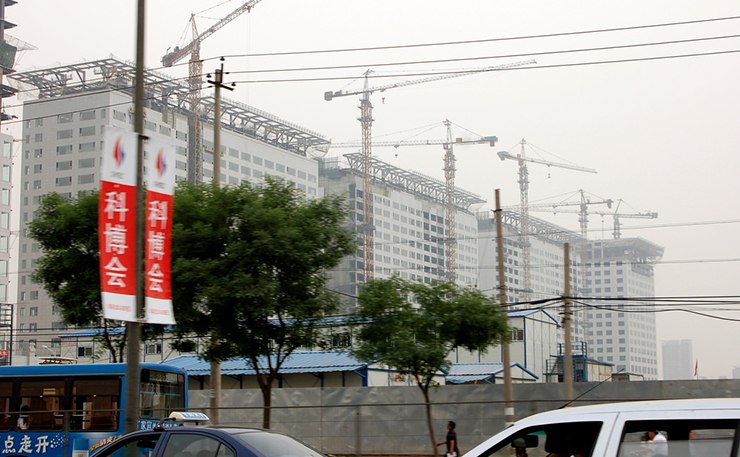A few good economic indicators and Coalition disunity are distracting us from fundamental structural weaknesses in the Australian economy, writes Ian McAuley.
If only Tony Abbott could behave himself, Malcolm Turnbull could celebrate the achievements of his first year in office. Steering a needs-based funding model for education through his own party room and through the Senate has been quite a political achievement as Ben Eltham points out.
And going by the usual indicators the economy seems to be travelling reasonably well. Job advertisements are up, the unemployment rate is creeping downwards, inflation certainly isn’t a problem, and economic growth, while low, is at least positive. Australia has survived the end of the mining boom.
But not all is well, as independent economists are warning.
The most pressing problems are the related phenomena of inflated house prices and high household debt. Australian policymakers avoid talk of a housing bubble – they don’t want to be accused of spooking the market and spoiling the party for heavily-geared speculators – but more detached observers, most recently Willem Buiter, Citigroup’s chief economist, are calling it as they see it. It’s a bubble.

For hard evidence we can turn to our own Reserve Bank Governor, Philip Lowe. In a speech in May he laid out a disturbing suite of data, showing high household debt, low disposable income, high house price to income ratios, and housing supply catching up with demand (confirmed in an analysis of recently-released census data). He didn’t use the “B” word, however, and at first reading one may gain the impression that he believes there is nothing to worry about.
But his wasn’t a message of complacency. He said that even if there were a sharp and rapid fall in housing prices, the banking sector could cope. Tighter prudential standards on Australian banks and recent restrictions on lending to speculators should protect the banks from a 2008-type crisis, but he didn’t say there wouldn’t be economic pain, particularly for heavily-indebted housing speculators.
Lowe’s job is to see to the resilience of the finance sector. Attending to the health of the whole economy is the job of the Treasurer, who seems to be asleep at the wheel.
When the bubble bursts – as it already has done in Western Australia – it’s not only heavily-indebted property speculators who will feel the pain. There is also the wider problem of stagnant and falling real incomes. When real incomes fall, for a time people keep up their spending by running down savings and taking on more debt. That’s why, so far at least, retail sales have more or less held up.
But such a coping mechanism is only a stop-gap. At some point spending, particularly discretionary spending, has to fall, and there will be a double whammy when people reach their credit limits and interest rates rise, as they eventually must. That was the subject of a recent warning from the Bank of International Settlements.
Another significant economic weakness is our narrow export base and high level of foreign debt. Poor export performance is feeding into our foreign debt.
Even though the mining boom is past, our exports are still dominated by unprocessed mineral and agricultural products. Minerals, mainly iron ore and coal, comprise 54 per cent of our physical exports, while agricultural commodities comprise another 16 per cent. And just on a third of our exports are to one country, China.
We therefore depend on China’s fortunes and policy directions. Many commentators are warning that China risks a recession triggered by a credit crunch, because its level of corporate debt is unsustainable. And even if China does not slide into recession, its economy is slowly making a transition away from physical construction to more service-orientation, with clear implications for demand on iron ore and metallurgical coal. And as for thermal coal, we may have plenty of it, but apart from the “coal is good for humanity” followers, almost all market analysts believe no-one will want it in a few years.

Then there’s our high level of foreign debt – the debt that no one wants to talk about because it’s so huge. No, I’m not talking about government debt, and one may be forgiven for not realising the difference between foreign debt and government debt, because those who should be concerned – the Treasurer, the Shadow Treasurer and most journalists – don’t mention it.
It’s the debt we owe collectively to the rest of the world, because since 1973 we’ve been importing more than we’ve been exporting, balancing the books by relying on foreign capital inflows. Our net foreign debt now stands at a trillion dollars or 60 per cent of GDP . Thirty years ago it was only 30 per cent of GDP, and it is now one of the highest in the “developed” world.
The Government is hoping that by offering corporate tax cuts to foreign investors, and infrastructure support to companies such as Adani, it can keep this model going a bit longer – at least until the next election. But, as countries such as Nauru have found out, there comes a time when there’s not much more to dig out of the ground, and all the profits have gone overseas. That’s when a country has to earn its living in a competitive market by doing cleverer things than inviting foreigners in to take away its minerals – or face a South American future of genteel poverty.
Then there is the overwhelming problem of widening inequality in wealth, income and opportunity. Ever since around 1980 governments, Labor and Coalition, have pursued a neoliberal agenda, tacitly accepting rising inequality as a collateral cost of economic dynamism.
But we have had the costs without the claimed benefits. In an Australian tradition that goes back to 1788, those who have prospered have been the property speculators, the financiers, the rent-seekers, the people who have milked profits from privatised utilities such as airports, toll roads and electricity concerns, and from publicly-subsidised services such as private health insurance, child minding and technical education.
As Cameron Murray and Paul Fritijers describe in their book Game of mates: how favours bleed the nation, this is a country where rewards go not to entrepreneurs but to those who can exploit a tax break or a favourable regulation, and to those who have a mate in local government who can get a block re-zoned, a mate in state government who can give them a contract for a toll road, a mate in federal government who can legislate to protect their interests. Making a living by doing anything useful in a competitive market is a mug’s game.
If we want to allocate blame for this situation there is plenty to spread around. Labor in government, state and federally, was sucked in by the promises of neoliberalism – they should have known better. And more recently the indolent Howard Government rode on the reforms of the Hawke-Keating Government, the fortune of taking office before a cyclical upturn, and the investment phase of a mining boom. It used those temporary high revenues to hand out favours to mates, rather than investing to secure our future prosperity.
But so long as each short-term economic indicator looks good we can ignore our structural weaknesses. She’ll be right mate!
Turnbull can be comforted by his party’s belief that they are the custodians of good economic management – a triumph of faith over evidence. And Shorten can coast his way to office – why would an opposition bother with a policy platform when the government is tearing itself to pieces?
Donate To New Matilda
New Matilda is a small, independent media outlet. We survive through reader contributions, and never losing a lawsuit. If you got something from this article, giving something back helps us to continue speaking truth to power. Every little bit counts.






